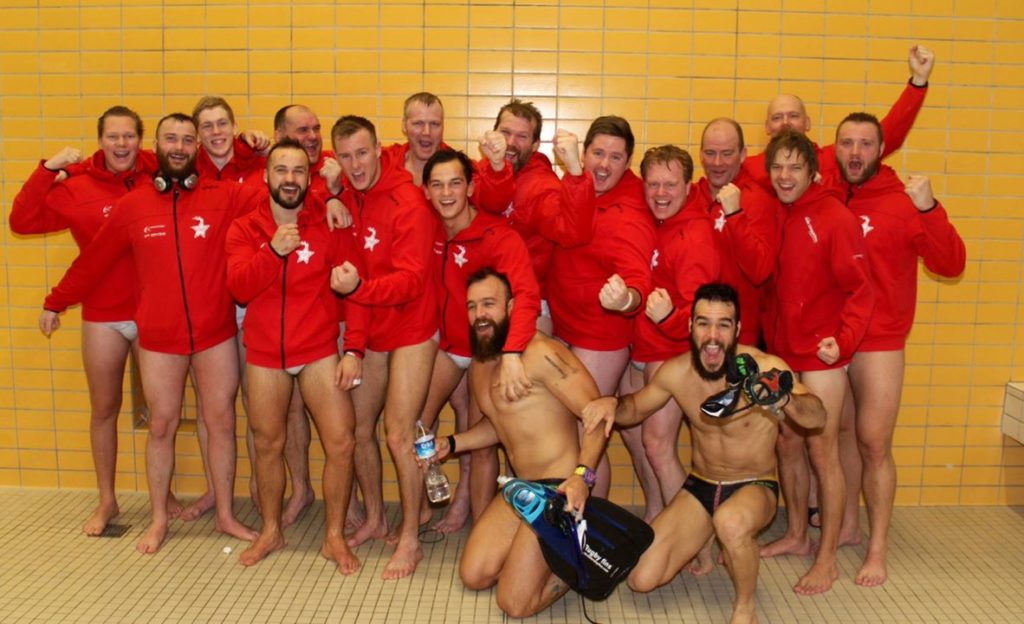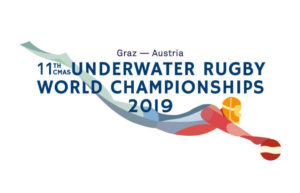In addition to understanding tactics and strategy, underwater rugby coaches must have an artistic ability to put a club on a positive track.
“We have to score in the first minute,” said the coach of a pickup team, huddling prior to a match at the Felix Cup in Gothenburg. “If we lose the ball, fight to get it back immediately. Instead of swimming back to defend the goal, stop them right there. Don’t let them move forward. They might reach our goal; we have to accept that risk. Whoever is closest will do their best to stop them. Remember, we need to score in the first minute to win this game.”
In a 5-meter deep pool ( understanding how depth changes the nature of the game:
1m – I’m too young to die.
2m – Hey, not too rough.
3m – Ultra-violence.
4m – Killing me softly [sweet spot]
5m – Nightmare! ) the coach only had a plan for the first 60 seconds of the game. It was weird but it made sense.
The team—a hodgepodge of players from different countries and clubs— had met on social media and agreed to form a team with strangers. They shelled out money to travel to Sweden and put up their share of the entry fee. There was a strong desire to compete and play well. Naturally the members had to go through a phase of getting to know each other on land and in the water. Now that the competition was nearing the end the players found that shared a desire to finish as highly as possible in the standings.
At the time of the huddle, they faced their toughest test: a team that was more or less from a single club. They were big guys who walked tall to and from their matches. From the results posted on the wall, this “true” club team also looked stronger. However, once the start horn sounded they were surprised by the 60-second team. It confounded them that the patchwork kept coming hard and fast. The stronger team thought that they would easily control the game. Yet they never did. The transients emerged from the water with smiles on their faces. Whether the pickup team tied or won the game, escapes me because it was many years ago. But I remember they were happy.
Despite the coach’s limited opportunity to shape the team, he had had an impact. Instead of advising each position in tactical detail, he requested all members to play as well as they could, according to their own understanding, whatever that might have been. Keeping it simple, he had turned the underdog’s uncertainty into an asset instead of a liability.
Under the stress human beings tend to seek someone to take charge. With luck the right one emerges. Successful coaching is the psychological art of leadership in real competition. This coach for a weekend provided a classic lesson.
Building from scratch versus making do
In professional sports club owners employ coaches to plan a team’s long term development. Players sit in classrooms and study charts and films. Scouts travel far and wide to search for talent in other countries. Owners buy stars to strenthen their clubs. Coaches specialize in areas, such as fitness, offense and defense. At the very least, underwater clubs ought to have one coach in the water and another on land. Often, though, even at the top level there is only a player coach who can never see the whole game.
With perhaps the exception of Tarkan Laleli’s Ege, underwater rugby clubs simply lack the financial basis for anything approaching professional management. Despite the lack of pay, though, some coaches make an effort to think long term. The Euroleague could never have survived if coaches were not inspired to consider the future beyond one season. Akkaren and Vienna did not stay in the league in part because no coach could get the necessary level of commitment from the players. To perform at a professional level without money is tough.
In some countries national team coaches are in the unenviable position of choosing a side from among players they scarcely see. The shortage of coaching has forced players to travel abroad in search of instruction. The most notable example of this is Samuel José Gaviria, the Colombian player from Orcas who made a historic decision to play with Molde while living in Great Britain.
Gaviria was determined to absorb everthing he could about the Norwegian club’s philosophy, strategy and tactics. Legend has it that at his first practice the Molde coach threw the Medellin star’s Technisub Stratos in the garbage and handed him a pair of Waterway fiberglass fins. Gaviria was already a fast swimmer but the Molde philosophy called on everyone to increase their speed if possible.
Yes, there are great skiers who love Norwegian retro wooden skis but no one can win in the World Cup or Olympics on them. Gaviria took the fins back to Colombia and became the national distributor. It was a business move but it was also a coaching decision. Although imported fiberglass fins are expensive in South America, the majority of elite players consider them necessary equipment.

Varying ambitions
Of course coaches have varying ambitions. For some keeping the game fun for a range of recreational players with different abilities is the goal. For some raising a team from the country’s ordinary division to the elite league or even the Euroleague is the dream. Some clubs are developing youth. Others are trying to win a national championship. Some are just trying to scrape together enough players to hold a decent practice. For Gaviria the goals are explict. He wants Orcas to win Champions Cup and Colombia to take world championship gold.
Speed, agility and endurance are mandatory qualities in Colombia. In parallel to physical training Gaviria places focus on the mental aspect.
“The way to win the first gold is simple” he said, “For the first time we must believe in what we are capable of doing.”
Is his definition of the challenge very different from that of the coach of the pickup team at Felix Cup?
The highest standards
There is a legendary quote from Molde’s Øyvind Nyhus about overcoming obstacles:
“If you don’t have enough money, sell your house. If your job will not let you off on Fridays, get a new job. If your wife or girlfriend complains about too much rugby, get a new woman,”
—Øyvind Nyhus
multiple champion,
Molde
“Yes. I have told my players those three rules,” confirmed Nyhus. “They are not special at all. We do not earn money from our sport, but if we love our sport there will be no problem to get to all competitions and all training practice. It’s all about priorities. To play for the best team is a reward that everyone values. If you love the sport enough, you will always do what is neccesary.”
Molde’s men and women have been National Champions over 10 times. The men’s team has won Champions Cup 5 times. The women once. Molde star Iver Iver Bjørnerem has scored 100 goals in 6 seasons of Euroleague competition. Many of the two-time world champion national team were coached by Nyhus. He has had a huge impact on the game. And yet he, too, can suffer fatique.
The last time I messaged him (several months ago) he said that he was no longer the coach of the club.
“Now I have just quit my work as a coach for Molde becouse it was too hard for me to get everyone to set their priorities as I wanted them to. Now a days I want to just play rugby for fun with no responsibility for everything around the club.”
It is hard to imagine Nyhus as a recreational player just going with the flow, but it is also difficult to imagine training as hard as he demands.
Surplus and shortages
From time to time I have had requests for coaches. There are hockey clubs that would like to play more rugby, but there is no one to go and teach them. In some cities there are 5 or 6 veterans who are capable of coaching at the elite level but there is no burden for them to bear, for there aren’t enough players to press them into service.
Some months ago South Africa said that they needed a national team coach to prepare for Graz. I think they might even scrape up the money for airplane tickets, but nobody has sent them a CV.
Originally posted Davrell Tien’s page (UW-Rugby.org).


